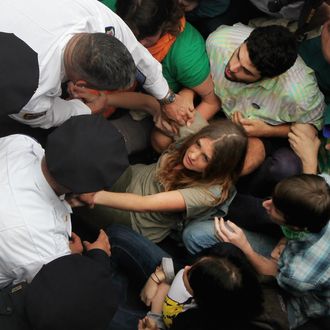
As hundreds of protesters arrested during months of Occupy Wall Street demonstrations get their day in court, their arresting officers aren’t even bothering to show up. When they have, as in the first two cases to go to trial, the NYPD testimony was disproved with photographic and video evidence, resulting in both protesters getting acquitted. Many of the others charged, most often with disorderly conduct (a violation, not a crime), will have to wait until at least September to go before a judge because the prosecution doesn’t have their police witnesses ready. As with contesting a traffic ticket, it’s often difficult to get cops to court, but when it comes to protesters, there’s probably more to it than busy schedules.
“Mass arrests were being used as a tactic, as a weapon to stop the expressive activity and to chill people from participating in OWS,” Norman Siegel, an Occupy attorney and former head of the NYCLU, told Daily Intel. “You deal with the protest at that moment and you limit future activity. Even if the city arrests people and there’s no conviction, so what?”
As reported by the Village Voice, multiple cases were postponed yesterday, in addition to those dismissed entirely, because of NYPD no-shows; in a sense, the officers’ job is already done. “To some extent it worked,” said Siegel, “because there’s now fewer people involved in OWS activity. It’s not what it once was.” Similar tactics were used, he said, at the Republican National Convention in 2004, but then, “they knew it was at most a week,” Siegel said. “Here it kept gaining momentum until [the eviction of Zuccotti Park].”
Many of those arrested have opted for ACDs, or Adjournments in Contemplation of Dismissal, in which the defendant is not required to plead guilty and the charges are dismissed if they’re not arrested again for six months. But for those willing to take it to trial, their odds of getting off are probably pretty good because following through was never really the point. “The defense lawyers are ready,” said Martin Stolar of the National Lawyer’s Guild. “If the D.A.’s not ready, it’s probably because they couldn’t get the cops in to interview them. They don’t really give that much of a shit when it comes to the D.A.”
And if the arrests were bogus to begin with? “They do have recourse,” Siegel said of the demonstrators, who can file a civil suit alleging false arrest. “They’re not going to get rich on these things, but depending on how long they were incarcerated, they could get $10,000.” Settlements like that, if they ever come to fruition, would be paid by taxpayers, and are not likely to bother the Bloomberg administration. “A percentage of those people won’t know they have a right or they’re too alienated by the system to do anything,” Siegel said. “Whoever goes ahead and sues, that’s just the cost of doing business for the City of New York.”





























